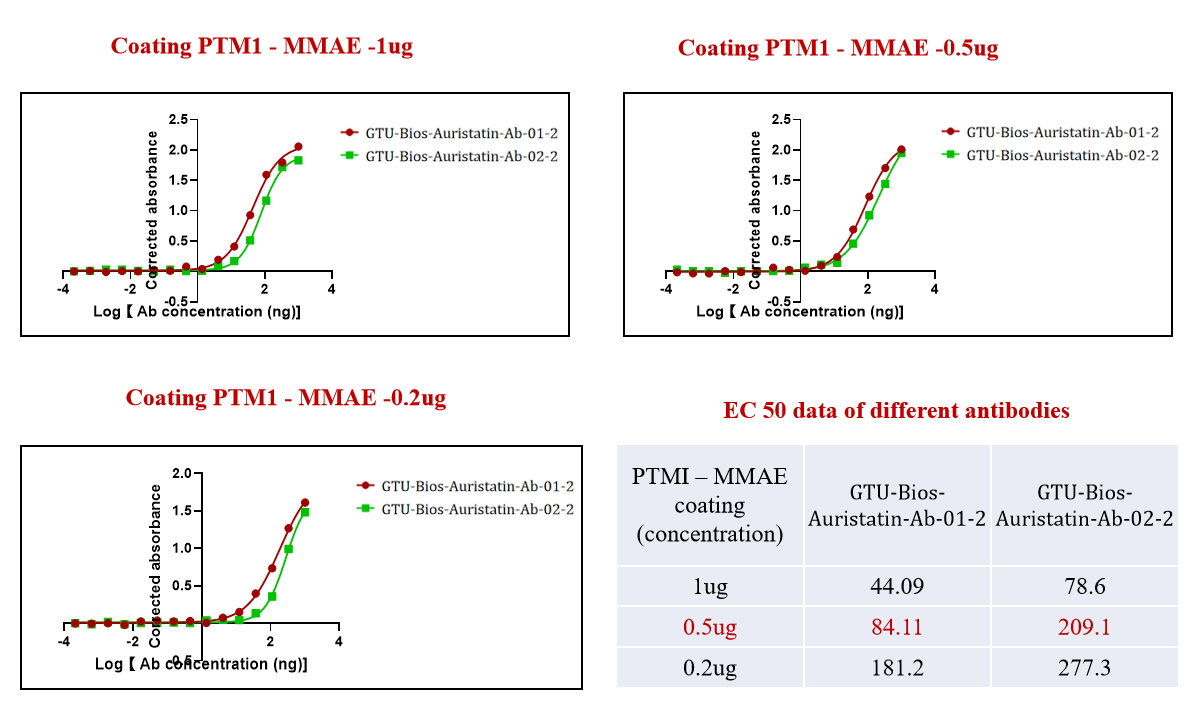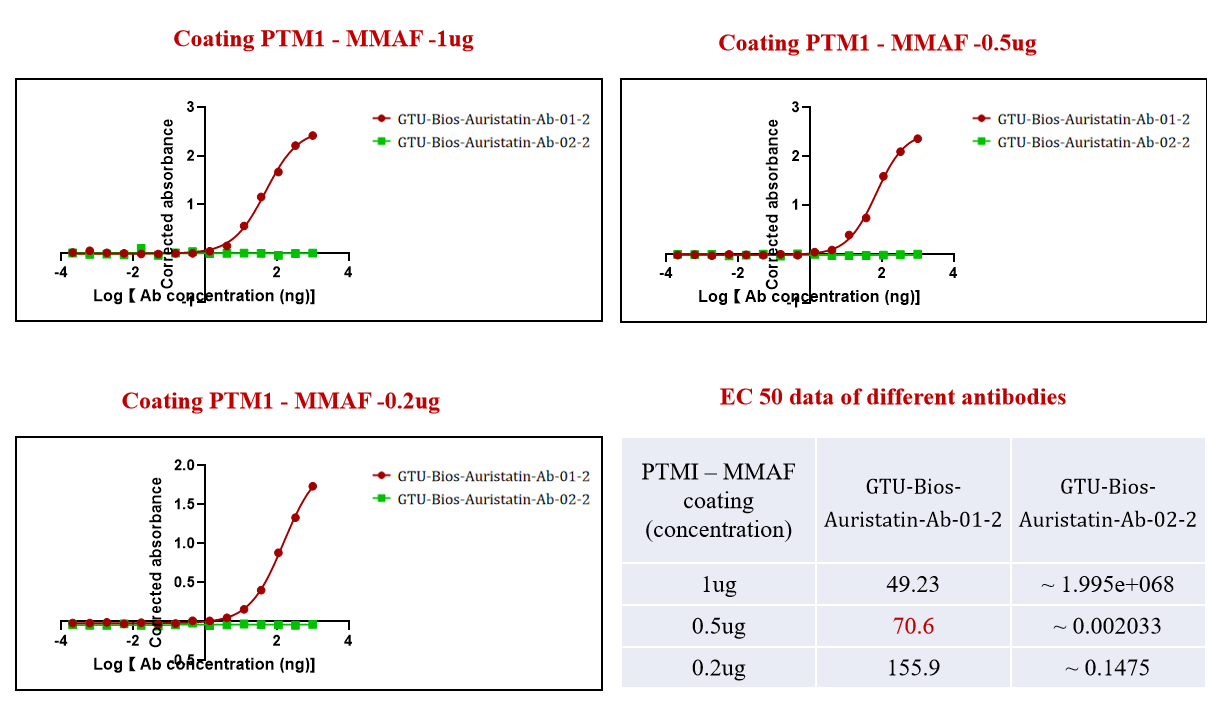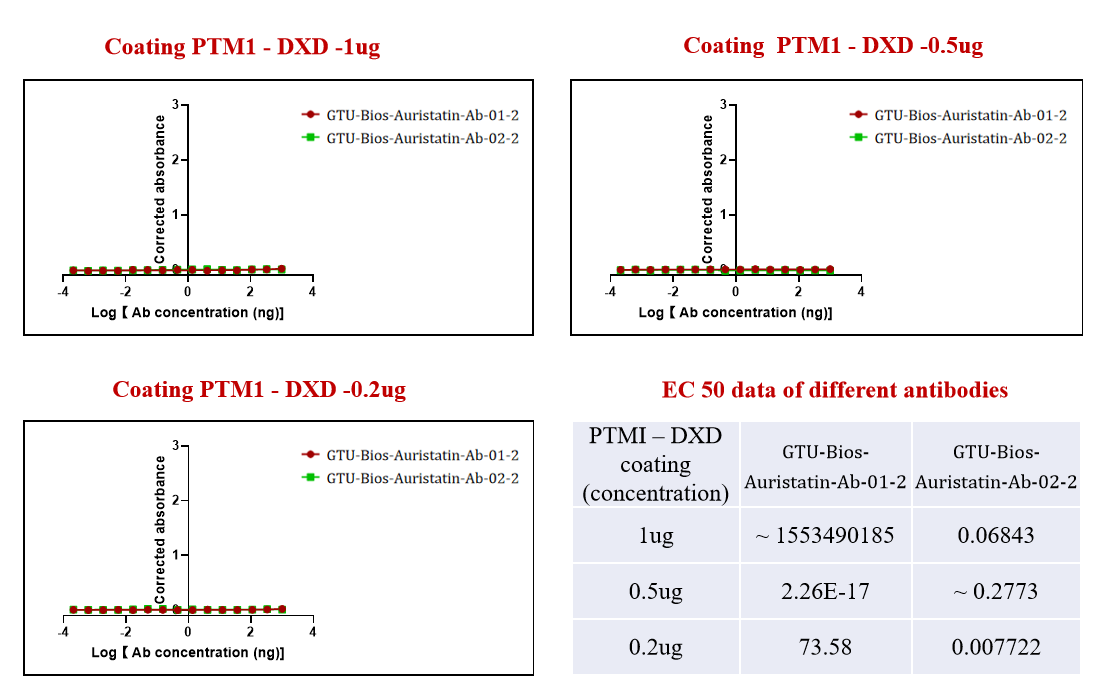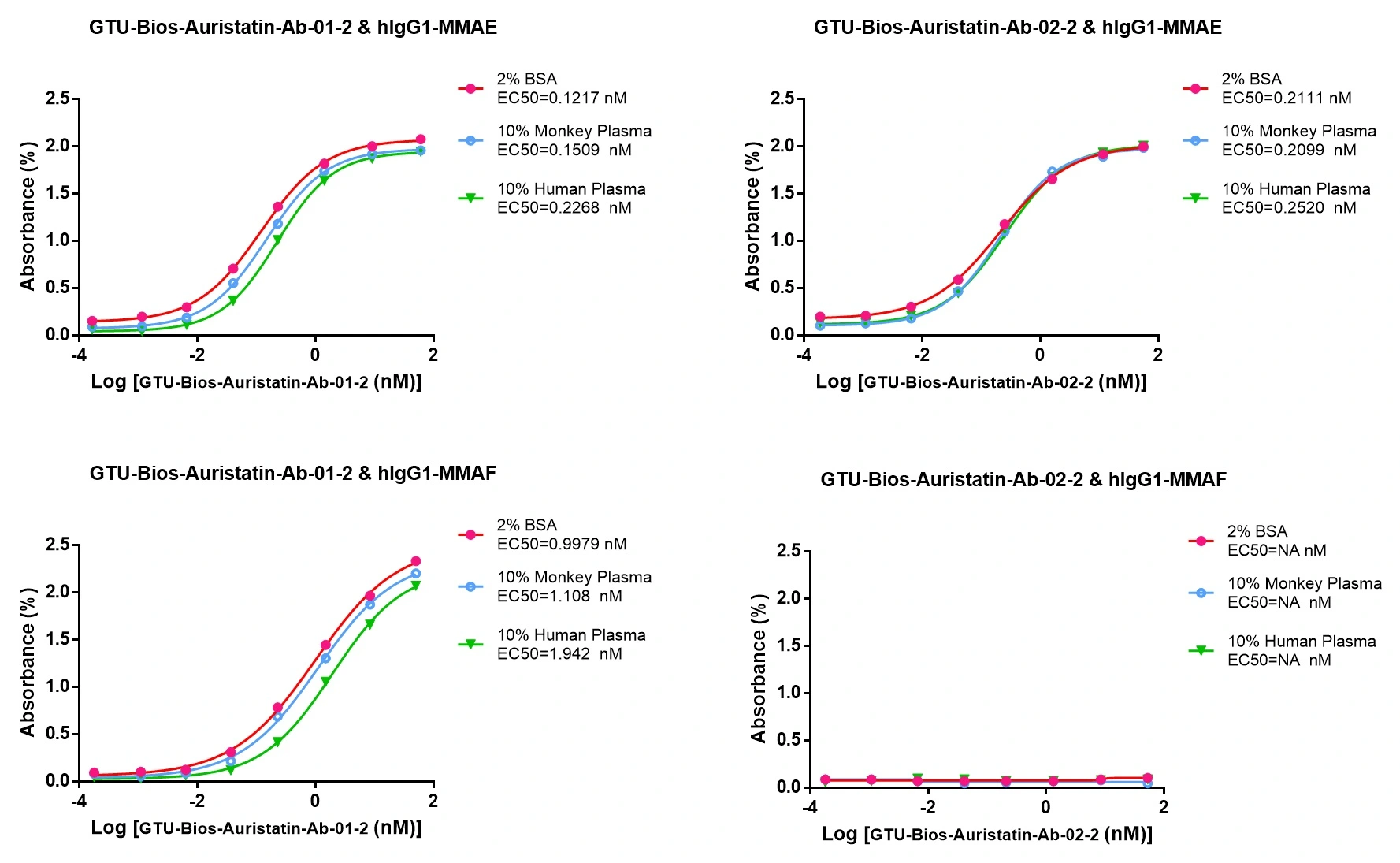Anti-MMAE/MMAF monoclonal antibody(mAb)
Our Anti-MMAE/MMAF Monoclonal Antibody has been created to fit the needs of those working on the pharmacokinetics of ADCs, as well as for understanding the nature of MMAE and MMAF. It provides a clear picture of the doses of MMAE/MMAF conjugated-ADCs and allow for proper analysis of the pharmacokinetic characteristics of the compound such as the absorption, distribution, metabolism and excretion profiles. This antibody is invaluable to those investigators dedicated to optimizing ADC treatments.
Check the Technical
Information

Order information
| Product Name | Catalog No. | Size | Price(In USD) |
|---|---|---|---|
| Anti-MMAE/MMAF human monoclonal antibody(mAb) | GTU-Bios-Auristatin-Ab-01-1 | 1mg | 1690 |
| Anti-MMAE/MMAF mouse monoclonal antibody(mAb) | GTU-Bios-Auristatin-Ab-01-2 | 1mg | 1690 |
| Anti-MMAE/MMAF mouse monoclonal antibody(mAb) | GTU-Bios-Auristatin-Ab-01-3 | 1mg | 1690 |
Size: 1mg | 10mg | 100mg
Описание
Anti-MMAE/MMAF human monoclonal antibody(mAb)
| Cat No. | GTU-Bios-Auristatin-Ab-01-1 |
| Product Name | Anti-MMAE/MMAF human monoclonal antibody(mAb) |
| Target | MMAE(monomethyl auristatin E)/MMAF(monomethyl auristatin F) |
| Expression platform | mammalian cell |
| Isotypes | Human IgG1 |
| Bioactivity validation | MMAE/MMAF binding, Competitive immunoassay validation (Competitive ELISA) in MMAE/MMAF level test. |
| Tag | hFc |
| Products description | Anti-MMAE/MMAF monoclonal antibody is expressed from mammalian cell. |
| Species | Human |
| Purity | Purity: ≥95% (SDS-PAGE) |
| Application | Competitive immunoassay validation (Competitive ELISA) and other Immunoassay, PK & PD assay for MMAE/MMAF payload of Antibody-drug Conjugate (ADC). |
| Formulation | Lyophilized from sterile PBS, PH 7.4 |
| Storage | Store at -20℃ to -80℃ under sterile conditions. Avoid repeated freeze-thaw cycles. |
Anti-MMAE/MMAF mouse monoclonal antibody(mAb)
| Cat No. | GTU-Bios-Auristatin-Ab-01-2, GTU-Bios-Auristatin-Ab-01-3 |
| Product Name | Anti-MMAE/MMAF mouse monoclonal antibody(mAb) |
| Target | MMAE(monomethyl auristatin E)/MMAF(monomethyl auristatin F) |
| Expression platform | mammalian cell |
| Isotypes | Mouse IgG |
| Bioactivity validation | MMAE/MMAF binding, Competitive immunoassay validation (Competitive ELISA) in MMAE/MMAF level test. |
| Tag | mFc |
| Products description | Anti-MMAE/MMAF mouse monoclonal antibody (mAb) is expressed from mammalian cell. |
| Species | Mouse |
| Purity | Purity: ≥95% (SDS-PAGE) |
| Application | Competitive immunoassay validation (Competitive ELISA) and other Immunoassay, PK & PD assay for MMAE/MMAF payload of Antibody-drug Conjugate (ADC). |
| Formulation | Lyophilized from sterile PBS, PH 7.4 |
| Storage | Store at -20℃ to -80℃ under sterile conditions. Avoid repeated freeze-thaw cycles. |
Ссылки
Validation Data
- Figure 1: Coating PTM-1 MMAE
- Figure 2: Coating PTM-1 MMAF
- Figure 3: Coating PTM-1 DXD
- Figure 4: Pharmacokinetic (PK) studies

Figure 1. GTU-Bios-Auristatin-Ab-01-2 and GTU-Bios-Auristatin-Ab-02-2 have been actively bound with the ADC (PTM-1 MMAE).
Figure 1 demonstrates the
efficacy of
GeneMedi's GTU-Bios-Auristatin-Ab-01-2
and GTU-Bios-Auristatin-Ab-02-2 in
actively binding with the ADC (PTM-1 MMAE). This underscores GeneMedi's
commitment to
producing
high-quality antibodies tailored for effective conjugation with MMAE-based
ADCs.
The robust
binding
displayed in the figure highlights GeneMedi's expertise in developing
antibodies
optimized
for
targeted drug delivery, a critical aspect in the field of antibody-drug
conjugates.

Figure 2. The GTU-Bios-Auristatin-Ab-01-2 has been actively bound with the ADC (PTM-1 MMAF). While GTU-Bios-Auristatin-Ab-02-2 has not been bound with the ADC with MMAF.
In Figure 2, the specificity of
GeneMedi's antibodies is showcased
as GTU-Bios-Auristatin-Ab-01-2 successfully
binds with the ADC (PTM-1 MMAF), while GTU-Bios-Auristatin-Ab-02-2 remains
unbound. This
specificity
is
pivotal in ensuring precise targeting of MMAE-containing ADCs, enhancing
their
therapeutic
efficacy
while minimizing off-target effects.
GeneMedi's ability to tailor antibodies to selectively
bind
with distinct drug payloads exemplifies their proficiency in antibody
engineering, offering
researchers reliable tools for precision medicine applications.

Figure 3. GTU-Bios-Auristatin-Ab-01-2 and GTU-Bios-Auristatin-Ab-02-2 have not been bound with the ADC conjugated with DXD.
Figure 3 illustrates another
aspect
of GeneMedi's antibody
specificity, revealing that neither
GTU-Bios-Auristatin-Ab-01-2 nor GTU-Bios-Auristatin-Ab-02-2 binds with the
ADC
conjugated with
DXD. This data
underscores GeneMedi's dedication to producing antibodies with high
selectivity,
ensuring
minimal
interference with undesired payloads.
By providing antibodies that exhibit minimal
cross-reactivity,
GeneMedi empowers researchers with precise tools for designing and
optimizing
ADCs for
targeted
cancer therapy, ultimately advancing the forefront of biomedical research
and
clinical
applications.

Figure 4: GTU-Bios-Auristatin-Ab-01-2 and GTU-Bios-Auristatin-Ab-02-2 can be used in pharmacokinetic (PK) studies involving humans and monkeys
GTU-Bios-Auristatin-Ab-01-2 has minimal impact in human and monkey PK studies and can be considered negligible. GTU-Bios-Auristatin-Ab-02-2 has even less impact than GTU-Bios-Auristatin-Ab-01-2 in these PK studies. Both GTU-Bios-Auristatin-Ab-01-2 and GTU-Bios-Auristatin-Ab-02-2 are suitable for use in human and monkey PK experiments.
Click to get more Data / Case study about the product.
Связанные продукты
| Cat No. | Product Name | Technical Information | Products Information |
|---|---|---|---|
| GTU-Bios-Maytansinoids-Ab | Anti-DM1/DM4 monoclonal antibody(mAb) | More | Details |
| GTU-Bios-Auristatin-Ab-01 | Anti-MMAE/MMAF monoclonal antibody(mAb) | More | Details |
| GTU-Bios-Auristatin-Ab-02 | Anti-MMAE (Specific) monoclonal antibody(mAb) | More | Details |
| GTU-Bios-DXd-Ab | Anti-DXd&Exatecan monoclonal antibody(mAb) | More | Details |
Leave a comment
- GENEMEDI
- Email: [email protected] [email protected]
- Telephone: +86-21-50478399 Fax: 86-21-50478399
- Privacy Policy
- TECHNICAL SUPPORT
- Product FAQs
- Technical manuals
- Publications
- Email: [email protected]








 Facebook
Facebook LinkedIn
LinkedIn Twitter
Twitter
Comments